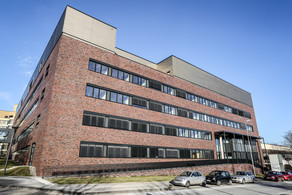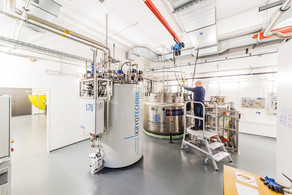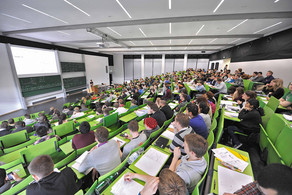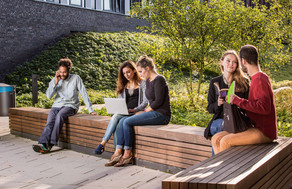Interdisciplinary Center Investigates Cross-Scale Dynamics
- News
- Research

The name of the new center stands for “Dortmund Center for Advanced Exploration of Dynamics Across Limits Using Spectroscopy”. Spectroscopy is an important analytical tool for many disciplines. It can be used to examine the interaction of matter with electromagnetic radiation (e.g. light) with customized properties, such as wavelength, polarization or pulse duration. At TU Dortmund University, for example, physicists use spectroscopy to study the properties of materials at the atomic level. Chemists, on the other hand, use it for molecular analysis, for instance to shed light on how proteins are structured and how they interact with their environment. In mechanical and electrical engineering, spectroscopy is important for developing new sensors or measuring techniques, while bioengineers and chemical engineers use it to explore medical applications or for process control purposes. Computer scientists are working on efficient ways to process and interpret spectroscopic data.
TU Dortmund University has outstanding expertise in various analytical methods: from ultrafast spectroscopy to high-resolution and nonlinear optical spectroscopy to photoemission spectroscopy,” said Professor Manfred Bayer, President of TU Dortmund University. “Within DAEDALUS, we are now bringing developers and users of spectroscopy techniques together and pooling their strengths.
The new cross-departmental research center encompasses especially physics, chemistry, mechanical engineering, electrical engineering, bioengineering, chemical engineering and computer science. Alongside the rectorate, around 80 scientists and representatives of the University Alliance Ruhr attended the opening ceremony.
“Our joint scientific goal is to decipher cross-scale dynamics even more effectively,” explained Professor Marc Aßmann from the Department of Physics, the spokesperson for DAEDALUS, using a vivid example to illustrate what he means: “Even an everyday occurrence, such as when a carrier bag tears, is caused by complex events taking place in the material: It begins with the stretching of single polymer chains, continues with the propagation dynamics of initially fine tears and ultimately results in the bag usually tearing at exactly the point where it is subjected to the greatest mechanical stress. We can only understand the entire process if experts in the respective areas deal collectively with all the associated scientific and engineering questions.”

To achieve this, both interdisciplinary cooperation within TU Dortmund University and collaborative research within the UA Ruhr are to be intensified in the field of spectroscopy. In the future, the scientists involved also want to apply together for a new Research Training Group comprising both chemists and physicists as well as for external funding for large-scale instrumentation used jointly by different disciplines.
Applying for a research center
Research centers are created at TU Dortmund University on the initiative of their future members and established after thorough evaluation by the rectorate. The duration of each center is five years and can be extended after review. During this time, centers are supported from central funds and by a coordination office on a pro rata basis. Research centers already have an international reputation at the time of application and can demonstrate established cooperation evidenced by funding or publications. Each center comprises at least five researchers from different departments, whose work covers at least three review boards of the German Research Foundation (DFG). Dr. Gunter Friedrich is the contact person responsible for advising on the establishment of research centers and on the application process.
Contact for queries:








